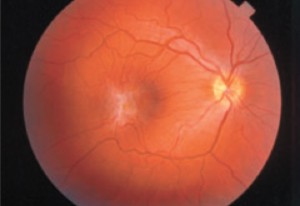By Lauren R. Rosecan, M.D., Ph.D., F.A.C.S. –
 A macular pucker (also called an epiretinal membrane) is a layer of scar tissue that grows on the surface of the retina, particularly the macula, which is the part of your eye responsible for detailed, central vision.
A macular pucker (also called an epiretinal membrane) is a layer of scar tissue that grows on the surface of the retina, particularly the macula, which is the part of your eye responsible for detailed, central vision.
The macula is the small area at the center of the eye’s retina that allows you to see fine details clearly. The retina is a layer of light-sensing cells lining the back of your eye. As light rays enter your eye, the retina converts the rays into signals, which are sent through the optic nerve to your brain where they are recognized as images. Damage to your macula causes blurred central vision, making it difficult to perform tasks such as reading small print or threading a needle.
As we grow older, the thick vitreous gel in the middle of our eyes begins to shrink and pull away from the macula. As the vitreous pulls away, scar tissue may develop on the macula. Sometimes the scar tissue can warp and contract, causing the retina to wrinkle or become swollen or distorted.
The macula normally lies flat against the back of the eye. When wrinkles, creases or swelling affect the macula, vision can become blurry and distorted and you may even have a blind spot in your central vision.
Macular Pucker Causes
As you age, the vitreous — the clear, gel-like substance that fills the middle of your eye — begins to shrink and pull away from the retina. As the vitreous pulls away, scar tissue may develop on the macula. Sometimes the scar tissue can warp and contract, causing the retina to wrinkle or bulge.
Other eye conditions associated with macular pucker include:
• Vitreous detachment
• Torn or detached retina
• Inflammation (swelling) inside the eye
• Severe trauma to the eye (from surgery
or injury)
• Disorders of the blood vessels in the retina,
such as diabetic retinopathy
Macular Pucker Symptoms
Symptoms of macular pucker range from mild to severe. Usually macular pucker affects one eye, although it may affect the other eye later. Vision loss can vary from none to severe vision loss, although severe vision loss is uncommon. A macular pucker does not affect your side (peripheral) vision.
For most people with macular pucker, their vision remains stable and does not worsen over time.
Macular Pucker Diagnosis
During an eye exam, your ophthalmologist will dilate your pupils and examine your retina. You may have a test called fluorescein angiography that uses dye to illuminate areas of the retina.
Another test called optical coherence tomography (OCT) is helpful in making an accurate macular pucker diagnosis. With OCT, a special camera is used to scan your retina. It measures the thickness of the retina and is also very sensitive at detecting swelling and fluid.
OCT can also diagnose macular abnormalities that are too small to be seen in an examination or with angiography.
Macular Pucker Treatment
For mild symptoms of macular pucker, you may not need treatment. Updating your eyeglass prescription or wearing bifocals may improve vision. Eye drops, medicines or laser surgery do not improve vision.
For more severe symptoms, a surgery called vitrectomy is recommended. The surgery is usually performed as an outpatient procedure in an operating room. During surgery, your ophthalmologist uses microsurgery instruments to remove the wrinkled tissue on your macula and to remove the vitreous gel that may be pulling on the macula. Sometimes an air or gas bubble is placed in the eye to help the retina heal or to seal any tears or holes.
After the tissue is gone, the macula flattens and vision slowly improves, though it usually does not return all the way to normal. After the operation, you will need to wear an eye patch for a few days or weeks to protect the eye, and you may need to do some particular head positioning if an air or gas bubble was placed in your eye during surgery. You will also need to use medicated eye drops to help the eye heal.
In most cases, while vision improves after macular pucker surgery, it generally does not return to normal. It can take up to three months for vision to fully recover. On average, about half of the vision lost from a macular pucker is restored; some people have significantly more vision restored, some less. In most cases, the visual distortion of macular pucker is significantly reduced.
Lauren R. Rosecan, M.D.
West Palm Beach
901 North Flagler Drive, 33401
(561) 832-4411 Office
(561) 832-1591 Fax
Stuart
618 East Ocean Blvd., #3, 34994
(772) 287-7026 Office
(772) 220-4186 Fax
Palm Beach Gardens
11382 Prosperity Farms Rd., #128, 33410
(561) 627-7311 Office
(561) 627-6791 Fax
Boca Raton
1050 NW 15th Street, #114, 33486
(561) 368-7723 Office
(561) 368-0093 Fax
Check Also
Trusted Homecare Agency: Serving Veterans with Free Supplemental Home Healthcare
When it comes to healthcare, veterans deserve the best care possible. For veterans seeking in-home …
 South Florida Health and Wellness Magazine Health and Wellness Articles
South Florida Health and Wellness Magazine Health and Wellness Articles




